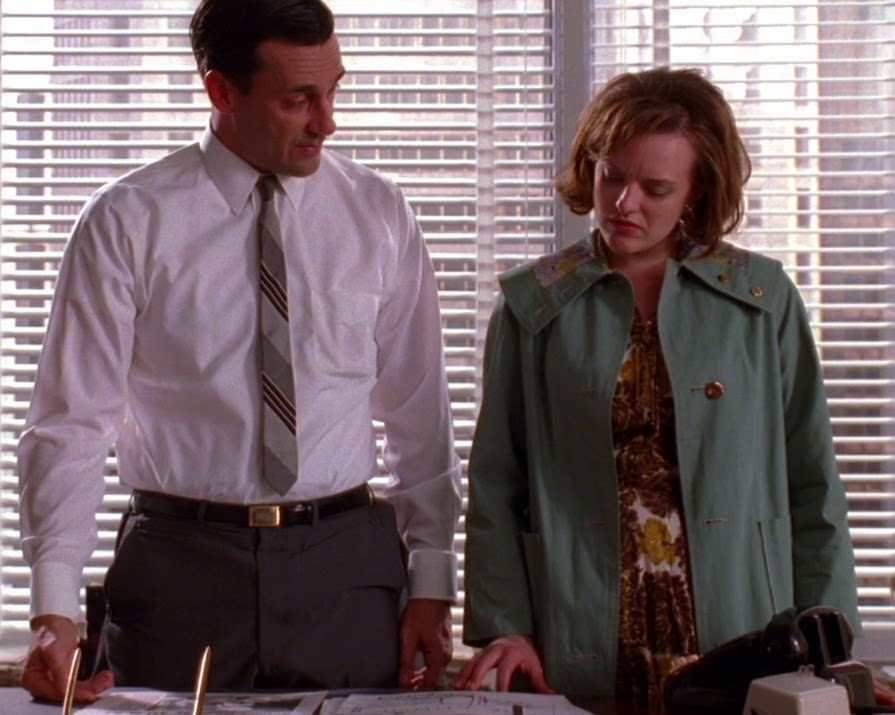By Grace McGettigan
11th Sep 2019
11th Sep 2019
Mad Men - Don Peggy Screencap
A new report by the ESRI shows men receive over €600 more than women in their monthly pension. This gender pension gap isn’t surprising though, is it?
Irish men receive a much higher pension than their female counterparts, a new study has found. Am I surprised? Not really.
The new report called ‘Gender, Pensions and Income in Retirement‘, shows the average weekly pension income for men was €433, versus €280 for women.
That’s a gender pension gap of 35%, or more than €600 a month.
While the Economic and Social Research Institute (ESRI) puts this down to a variety of complex factors, they have nonetheless called on policy-makers to close the gap where possible.
Why the difference?
According to the report, a key element of the gender pension gap has been attributed to differences in occupational and private pensions across men and women.
While both men and women are entitled to the state pension, it seems more men are benefiting from an additional private pension too.
For example, of those surveyed, 88% of men and 93% of women were in receipt of the state pension. Meanwhile, 55% of men and just 28% of women were in receipt of occupational and private pensions.
“Women are less likely than men to be employed, and when they are employed, on average, they earn less, work fewer hours and have shorter careers”
Another key issue is that men have worked for a longer amount of time than women; with 93% of men having more than 30 years’ work experience compared to just 33% of women.
“Even when working in similar positions to men, women can face lower wages and lower promotion opportunities,” the report reads.
“Therefore, women are less likely than men to be employed, and when they are employed, on average, they earn less, work fewer hours and have shorter careers.
“Each of these labour market outcomes translates into divergences in pension income and a gender pension gap that is largely positive,” the ESRI says.
No surprise
These findings come as no surprise. Books have been (and continue to be) written about gender inequality in the workplace. Why should that change after retirement?
The National Standards Authority of Ireland (NSAI) says Irish women are more likely to work part-time, earn less money and are inadequately represented in business when compared with men.
Not only that, but women often find themselves lagging behind when it comes to equal opportunities and income. The European Commission found that, in some cases, women suffer direct discrimination where they’re simply treated less favourably than men (for example, when it comes to promotions and bonuses).
“We are firmly opposed to forcing parents through economic necessity (for example, excessive childcare costs), to stay in the home against their wishes”
Then, on the issue of men having more work experience than women, what else would you expect?
Taking out maternity leave, increasing childcare costs often discourage mothers from returning to work, despite the fact they might want to.
The Stay-At-Home Parents Association of Ireland says, “We are firmly opposed to forcing parents through economic necessity (for example, due to excessive childcare costs), to stay in the home against their wishes. However, the reverse is also true.
“Making an assumption that paid labour is liberating while home childcare is not, is problematic for many women. Choice is liberating.”
Equal opportunities
In order to reduce the gender pension gap, the ESRI says we need to create equal opportunity policies targeted at both women and men of working age.
This is essential in order to promote equal labour market access (for example, equal distribution of caring responsibilities, equal pay legislation and career break entitlements). The ESRI adds pension policies that adequately protect against care-related interruptions, such as childcare, are vital.
According to the report, these new policies should promote supplementary pension savings for women (based either on occupational pensions or individual/personal pension savings).
“This will provide additional retirement savings and complement statutory pensions for women and reduce the gender pension gap.”
Photo: ‘Mad Men’, Weiner Bros.
Read more: In your 40s and worried about money? Read this
Read more: Money management in your retirement
Read more: The time has come for women to talk about money























